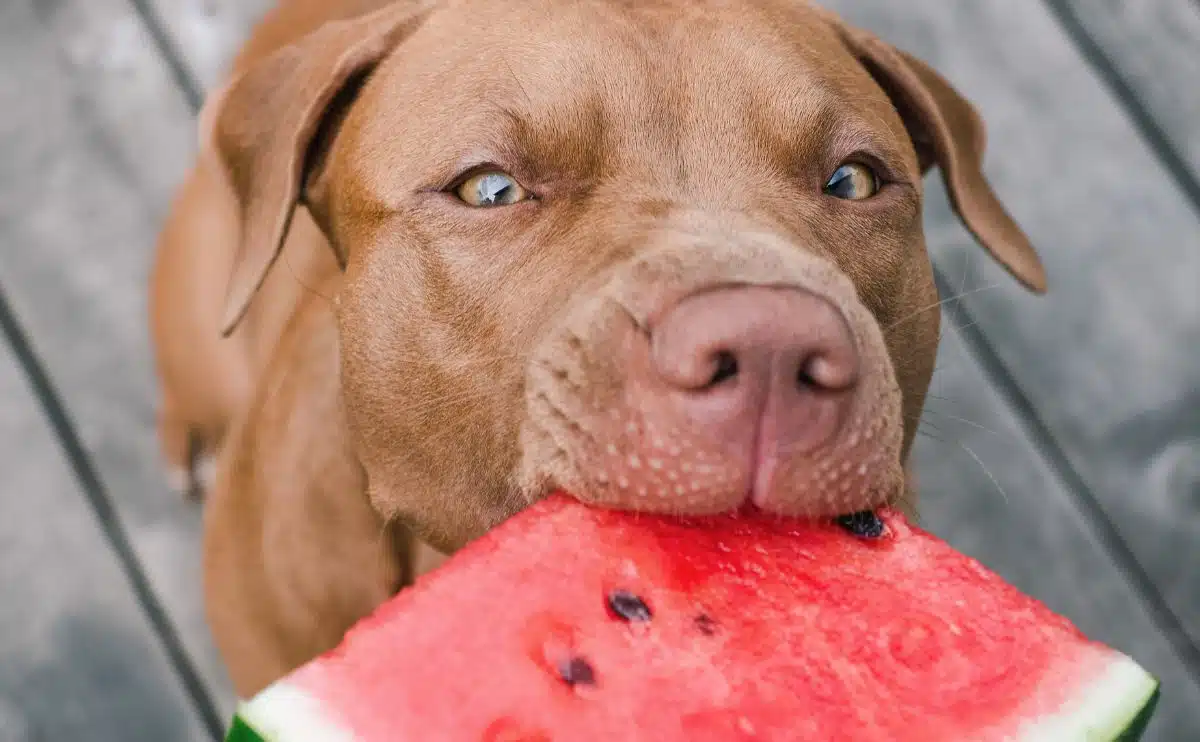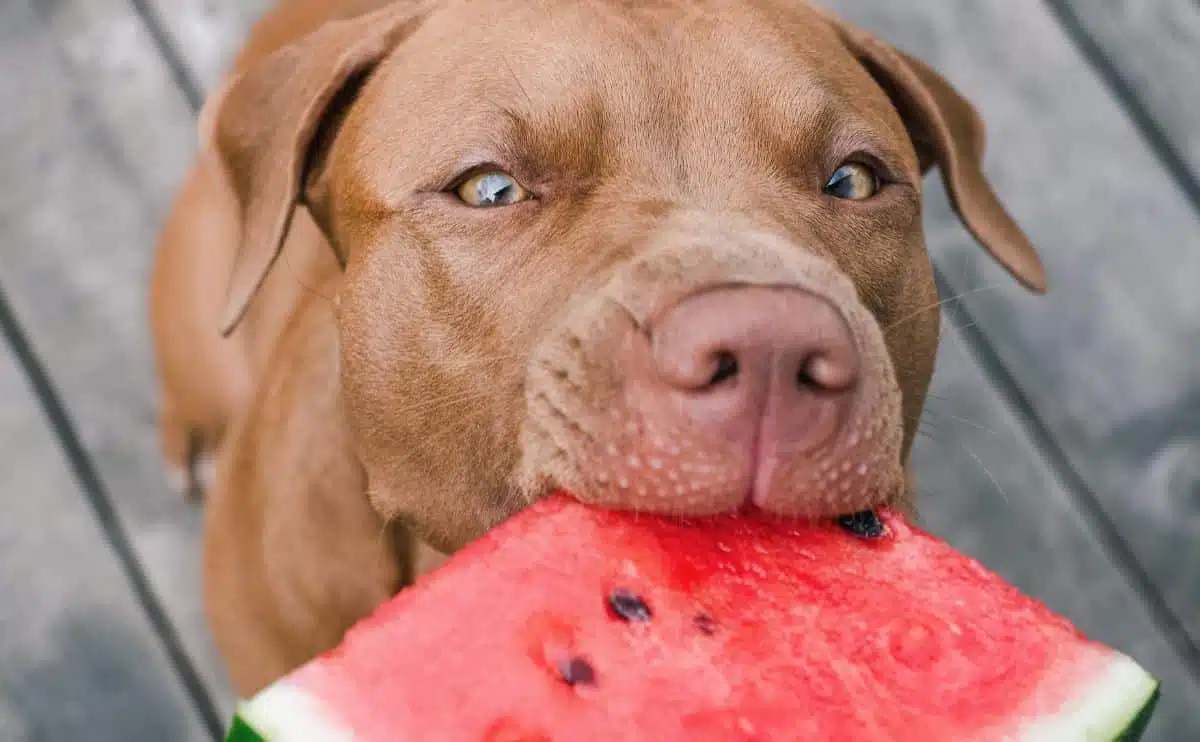
To keep the lights on, we receive affiliate commissions via some of our links. Our review process.

Watermelon is a favorite fruit of many pet owners, and it can be tempting to share a piece of this juicy sweet melon with your pup. Can dogs eat watermelon? Is this a safe fruit choice for them? We can help clear up some questions owners may have about this juicy treat, also known as Citrullus vulgaris.
Is Watermelon Safe For Dogs?
Contents
Yes, the fruity flesh is safe for dogs. It makes our list of top fruits to feed dogs. This fleshy melon is 92% water and contains nothing toxic to canines. Because of its high moisture content, this melon can be a highly effective and tasty way to get extra hydration into your pup’s diet. The melon is also high in sugar, so it should not be an everyday snack.
Be sure to remove all seeds, as these are hard to digest and can become choking hazards or internal obstructions. The rind should not be consumed, as it is very fibrous and is likely to cause choking or bowel obstruction.
Watermelon, like other healthy and safe fruits and vegetables, is a tasty treat but should never take the place of a complete, balanced diet. If you have concerns about your pup’s nutrition, it is best to consult your veterinarian and an animal nutrition expert before making significant changes.
Is Watermelon Good For Dogs?
Watermelon does have some benefits, but it should only ever be a treat, as it alone does not add much nutritional value for your pup. Benefits include:
- This fruit is high in vitamins A, B-5, B-6, and C, as well as magnesium and potassium.
- It contains the amino acid arginine, which helps burn fat.
- The fruit has low calories and few carbohydrates.
- No fat, salt, or cholesterol.
- High in moisture, beneficial for hydration.
- All natural, no artificial ingredients, etc.
Is Watermelon Bad For Dogs?
In moderation, watermelon is not bad for dogs to eat. It does have high sugar content, so it must only be an occasional treat. Canines who overindulge may not feel well and can experience stomach distress. They may start to experience a loss of appetite, low energy, depression, and physical discomfort. Some may start licking their lips and other objects or seem to swallow the air.
More concerning symptoms include weakness, diarrhea, vomiting, and even collapse. Watch out for blood in the stool or vomit. Should your dog experience these more serious symptoms, seeking veterinary care as soon as possible is best.
Any dog experiencing an intestinal blockage will be in great danger. This condition can quickly become life-threatening. Because of this risk, keeping all rinds away from your pet is pivotal. A few seeds are not likely to be a problem, but these are not something dogs should eat a lot of.
Our Personal Experience With Dogs Eating Watermelon
Speaking from my own dog ownership experience, this is a fantastic treat for my pups. My black Labrador Bear adored watermelon. He would overindulge if it were up to him. Just getting it out of the fridge was enough to get him excited for a juicy treat. This is one of the messiest and stickiest melons around, so it is best to feed it to your pets outside, somewhere you can easily hose off. This is important because sugary juice will attract plenty of bugs and lots of ants. Ants will bite a dog’s feet, which is quite painful.
More About Watermelon Seeds
Most Citrullus vulgaris seeds are small enough that a dog can chew them and pass a few through the digestive tract without much trouble. However, canines should avoid eating these if they can. They contain low levels of cyanide, though a pup would need to eat quite a large amount for this to be a concern.
The white seeds are those which did not mature fully and are softer, so they are less of a choking hazard, but it’s not wise to let your pup eat a lot of these. It may lead to an upset stomach.
The black seeds are harder and larger. Some pups may crunch through them, but too many can lead to a painful blockage. If possible, stick to de-seeded or seedless melons for canines.
What Type Of Watermelon Can I Give My Dog?
Dogs can safely eat the fruity flesh of red and yellow varieties. They should not eat the seeds or the white or green parts of the rind. Stick to fresh, de-seeded fruit, cut away from the rind. Cut into small, bite-sized pieces. Do not add anything else to it, including salt or sugar. Plain, fresh fruit is best.
Some pups may like this mixed with other fruits, like blueberries, apples, and bananas. You can blend these up to make a tasty smoothie for your sweet pup. This can even be frozen or mixed with dog-safe peanut butter for an even more flavorful treat.
Avoid artificially flavored watermelon foods, as these often contain artificial flavors, dyes, and sweeteners like xylitol, which is toxic to canines.
Keep in mind that even seedless varieties often still contain small white and yellow seeds. Try to stay away from all seeds. Many owners use a melon baller to cut fruit just the right size and make it easy to see and remove seeds.
What About Watermelon Juice?
If your dog likes melon juice, it can be a tasty, refreshing way to cool down on a balmy day. Make sure the juice has no added ingredients and no added sugar. Also, be sure to check for those pesky seeds. Use juice you have made yourself fresh to be sure no added sweeteners or unsafe fruit juices are added.
How To Feed Your Dog Watermelon
- Start with fresh fruit.
- Wash to remove any pesticides, dirt, or chemicals.
- Slice and remove the flesh from the rind.
- Use a melon baller or knife to create small, manageable pieces.
- As you break this down, remove all seeds.
- Serve it to your pet, fresh or frozen.
My Dog’s Poop Is Red After Eating Watermelon
Many pet owners will notice red stools after their pup consumes red melons. This is not usually a sign of blood. Instead, the melon coloring the feces is common. However, if your pet is pooping bright red after eating this fruit, you may want to feed him a little less. Remember, this is an occasional treat, not an everyday part of his diet.
If your pet is experiencing digestive upset, constipation, or diarrhea after consuming the fruit, and has bright red stools, reach out to your vet, as you want to be sure the red is from melon, not blood. Overfeeding the fruit can lead to digestive issues as it has a good amount of fiber.
Can My Dog Be Allergic To Watermelons?
It is quite rare for a canine to be allergic to Citrullus vulgaris, but it can happen. Signs of an allergy can include itchiness, hives, inflammation of the ears, and stomach upset. If you suspect an allergic reaction, immediately take your pet to the nearest vet.
What Other Fruits Can My Dog Eat?
While fruit should not make up a large part of the canine diet, several kinds can add flavor and nutritional benefits. Other melons, such as cantaloupe and honeydew, are safe in moderation. Pumpkin puree, for example, can help with digestion, constipation, and diarrhea. Apples, bananas, pineapple, blueberries, cranberries, cucumbers, papaya, apricot, and even coconut are safe as occasional treats. Some of these will also be included in commercial dog foods and treats. Make sure you never feed your pup grapes or raisins, as they can be quite toxic to some dogs and can poison them. Avocado is another big no-no, as it contains Persin, a very dangerous toxin for canines. We cover this in more detail in our guide regarding dangerous foods for dogs. There are plenty of other tasty doggie treats that owners can pick from.
It is always best to feed canines high-quality, balanced dog food. Keep size, breed, and life stage in mind. Discuss your pet’s nutritional needs with your vet, including the use of supplements and vitamins.
Tagged With: Food Safety